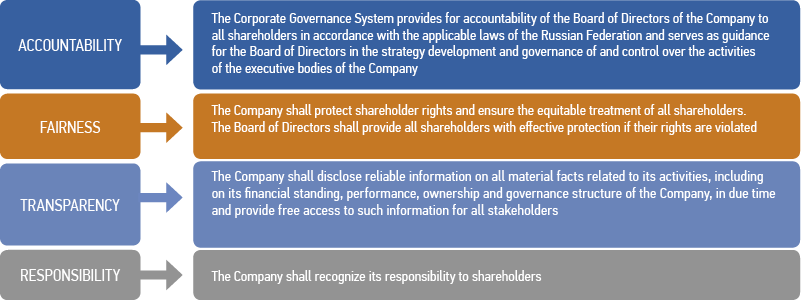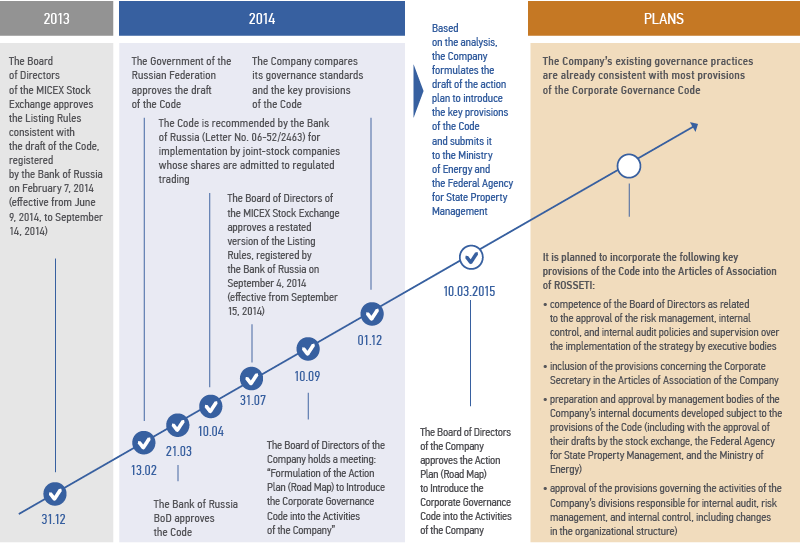Basic Principles and Structure of Governance
The formulation of the sustained development strategy and supervision over its implementation are ensured by the Company’s governance system.
ROSSETI ’s governance system is in accordance with the Russian applicable laws, the Articles of the Association and internal documents of the Company, and the Company’s obligations associated with the trading of securities in global stock markets. ROSSETI also applies global best practices in governance.
Principal Goals and Objectives of ROSSETI’s Governance
- ensure the unconditional, timely, and complete exercise of the legitimate rights and interests of all shareholders of the Company
- develop efficient interaction between the Company and its SDCs to develop and improve the reliability of the electric grid sector and increase the market value of ROSSETI and its subsidiaries and dependent companies
- enhance the transparency of decisions made by management bodies, maximize the disclosure of information about the Company’s activities, and improve the governance system of ROSSETI
- constantly improve the mechanisms for relations between the Company and shareholders, securities holders, and potential investors with due consideration to the Company’s obligations to third parties
- improve the existing forms and methods and develop new forms and methods for maintaining relations with shareholders to facilitate the exercise of their rights, and develop advanced means of communication for shareholder relations
ROSSETI guarantees that its shareholders will exercise all of their rights provided by Russian laws, the Articles of Association, and internal documents of the Company in relation to the placement and trading of shares and other securities of the Company and other obligations assumed by the Company in accordance with international best practices.
The Strategy for Development of the Electric Grid Sector of the Russian Federation approved by Ordinance of the Government of the Russian Federation No. 511-r of April 3, 2013, specifies that ROSSETI performs the following principal functions: strategic functions, coordinating and controlling functions, accomplishment of institutional goals faced by the entire industry, and participation in the consolidation of territorial grid organizations with the aim of ensuring the necessary reliability and quality of the power supply for customers
With the strategic goals faced by the Company, given that the Company is corporately organized as a group, in order to protect the rights and legitimate interests of the Company’s shareholders, ROSSETI ’s priority is to successfully and effectively conduct the core activities specified in the Articles of Association of the Company. In accordance with paragraph 3.2 of the Articles of A ssociation of ROSSETI , the Company’s core activities include exercising the rights of a shareholder (member) of the economic entities whose shares (stakes) are held by the Company.
Governance with respect to subsidiaries and dependent companies (SDCs) is important to the Company
As at December 31, 2014, the Company was:
- a shareholder of 42 open joint-stock companies
- a member of one limited liability company
- a member of five not-for-profit organizations (nonprofit partnerships) ROSSETI has a shareholding of more than 20% in 41 joint-stock companies
Detailed information about the internal documents governing the Company’s governance system can be found on the corporate website at http://www.rosseti.ru/eng/investors/reports/Internal-docs/
Holding a controlling interest in most SDCs enables the Company to:
- elect a majority of representatives to the boards of directors of most SDCs and control the most important decisions adopted by the boards of directors of SDCs with respect to SDCs’ core activities,
- control the decisions adopted by the general meetings of shareholders of most SDCs with respect to key issues,
- elect the internal audit commissions of SDCs with the composition that ensures control on the part of ROSSETI,
- appoint the sole executive bodies of SDCs by causing the boards of directors of SDCs to adopt the relevant decisions.
ROSSETI employs corporate methods to influence the decisions made by SDCs’ management bodies in accordance with corporate best practices and governance standards and considers it necessary to use effective governance for attaining the success of the financial and economic activities of the Company and its SDCs and making them more attractive to investors
The key mechanisms and principles that underlie governance with respect to SDCs are defined by the Articles of Association of the Company, the Procedure for Interaction of ROSSETI with the Economic Entities Whose Shares (Stakes) Are Owned by the Company (hereinafter, the “Interaction Procedure”), and other internal documents of ROSSETI .
In addition, in order to introduce a unified approach and standardize the governance system, the Company develops model internal documents for SDCs in various areas; such documents are methodological in nature and are recommended for use by SDCs.
Governance with respect to SDCs is effected through the Company’s representatives in the management
bodies (boards of directors and general meetings of shareholders) and control bodies (internal audit commissions) of SDCs
In accordance with the Articles of Association of RO SSETI and the Interaction Procedure, the Company’s management bodies define the position of its representatives on items put to a vote at general meetings of shareholders and boards of directors of SDCs.
The Articles of Association of the Company and the Interaction Procedure list the most important agenda items of general meetings of shareholders and meetings of boards of directors of SDCs, which agenda items require decisions of the Company’s Board of Directors.
Such key agenda items include:
- Defining agendas of general meetings of shareholders (members) of SDCs
- reorganizing or liquidating SDCs
- determining the number of members of boards of directors of SDCs, nominating and electing such members, deciding on early termination of their powers
The uniform corporate administration standards make it possible to create an integrated legal environment in the Company, achieve common strategic goals, and contribute to streamlining the work of management and control bodies of electric grid companies and reducing general administration costs
Based on the Model Regulations for the Internal Audit Commission developed by ROSSETI for ROSSETI ’s subsidiaries and dependent companies, the annual general meetings of shareholders of ROSSETI ’s subsidiaries and dependent companies approved the regulations for the internal audit commissions of SDCs in 2014.
Updating the regulations for the internal audit commissions of ROSSETI SDCs was necessitated by unifying the approaches and requirements applicable to the work of the internal audit commissions of the Company’s SDCs and by taking into account the existing provisions of SDCs’ articles of association, legal requirements, and recommendations of the Federal Agency for State Property Management of the Russian Federation.
In 2014, the Company formulated the Model Regulations for the Audit Committee of the Board of Directors for ROSSETI ’s subsidiaries and dependent companies, taking into account recommendations of the Federal Agency for State Property Management of the Russian Federation with respect to the organization of activities of the audit committee of the board of directors of a government-linked jointstock company and the provisions of the Corporate Governance Code approved by the Board of Directors of the Bank of Russia on March 21, 2014. Based on the Model Regulations for the Audit Committee of the Board of Directors for SDCs, the boards of directors of SDCs approved the regulations for the audit committees of the boards of directors of SDCs.
Based on the Model Internal Audit Policy, the Model Internal Control Policy, and the Model Risk Management Policy developed by ROSSETI for its subsidiaries and dependent companies, the boards of directors of subsidiaries and dependent companies approved the equivalent documents in 2014.
For the purposes of controlling financial and economic activities of SDCs and complying with governance procedures, the Company’s representatives also take part in the work of internal audit commissions of SDCs.
In view of the foregoing and pursuant to the Federal Law “On Joint-Stock Companies,” by virtue of a controlling interest in SDCs (i.e. as part of using governance methods to exercise the rights of a shareholder of SDCs), ROSSETI is able to determine the decisions adopted by SDCs’ management bodies (through its representatives on the boards of directors of SDCs) and influence SDCs’ activities. Additionally, RO SSETI representatives are elected to SDCs’ control bodies, namely the internal audit commissions of SDCs.
The Company, together with SDCs, continues to constantly improve the governance system based on Russian and international standards and best practices in building corporate relations
For instance, the Company discloses on its corporate website before the Annual General Meeting of Shareholders the draft of the Company’s Annual Report in Russian and English.
The Company ensures that IFRS interim financial statements are prepared and published on its corporate website.
The Company ensures that Russian-language information required to be disclosed under Russian laws is translated into English.
The Company prepares and posts on its corporate website the corporate social responsibility and sustainability report.
In the course of electing members of the committees of the Board of Directors of ROSSETI , the Company strives to ensure that the membership of the committees is properly balanced to ensure that different groups of shareholders take an active part in discussing the decisions made by the Board of Directors.
The Company strives to ensure that the A ction Plan of the Company’s Board of Directors provides for holding in-person meetings of the Board of Directors on a regular basis.
Improving both the efficiency of the management of government-linked companies on the part of the government and the efficiency of the operations of such companies will, in the next three years, require their corporate practices to be aligned with the Corporate Governance Code approved by the Government of the Russian Federation on February 13, 2014, and recommended by the Bank of Russia for use by joint-stock companies whose shares are admitted to regulated trading.
Improvement of the Governance System
The following principles underlie the Company’s governance:

On February 13, 2014, the Government of the Russian Federation approved the Corporate Governance Code as a recommendatory document. The Code was approved by the Board of Directors of the Bank of Russia on March 21, 2014, and recommended by the Bank of Russia (Letter No. 06-52 of April 10, 2014) for implementation by joint-stock companies whose shares are admitted to regulated trading.
As resolved by the Board of Director of the Company (Minutes of the Meeting No. 164 of September 10, 2014):
- the Company compared its governance standards and practices and the key provisions of the Corporate Governance Code (hereinafter, the “Code”) and assessed potential risks associated with introducing the provisions of the Code into the Company’s activities;
- based on the analysis, the Company formulated the action plan to introduce the key provisions of the Code into the Company (hereinafter, the “road map”).
The draft of the road map, along with the results of analyzing governance practices and the risk assessment with respect to introducing the Code, were submitted to the Ministry of Energy of the Russian Federation and the Federal Agency for State Property Management of the Russian Federation.
In March 2015, the Board of Directors approved the Action Plan (Road Map) to Introduce the Corporate Governance Code into the Activities of the Company (Minutes of the Meeting No. 179 of March 10, 2015)
In accordance with the approved road map, the Company plans to update the Articles of Association and some internal documents to bring their provisions into line with the Code.
Overall, it should be noted that the Company’s governance strategy was reflected in the road map approved by the Board of Directors of the Company in March 2015.
ROSSETI also plans to explore the possibility of engaging a Russian rating agency to assign a national corporate governance rating to the Company.
Corporate Governance Code: History and Introduction
In accordance with Directive of the Government of the Russian Federation No. 5667p-P13 of September 2, 2014, concerning the introduction of the provisions of the Code into the activities of government-linked organizations, the Company carries out the following measures:

